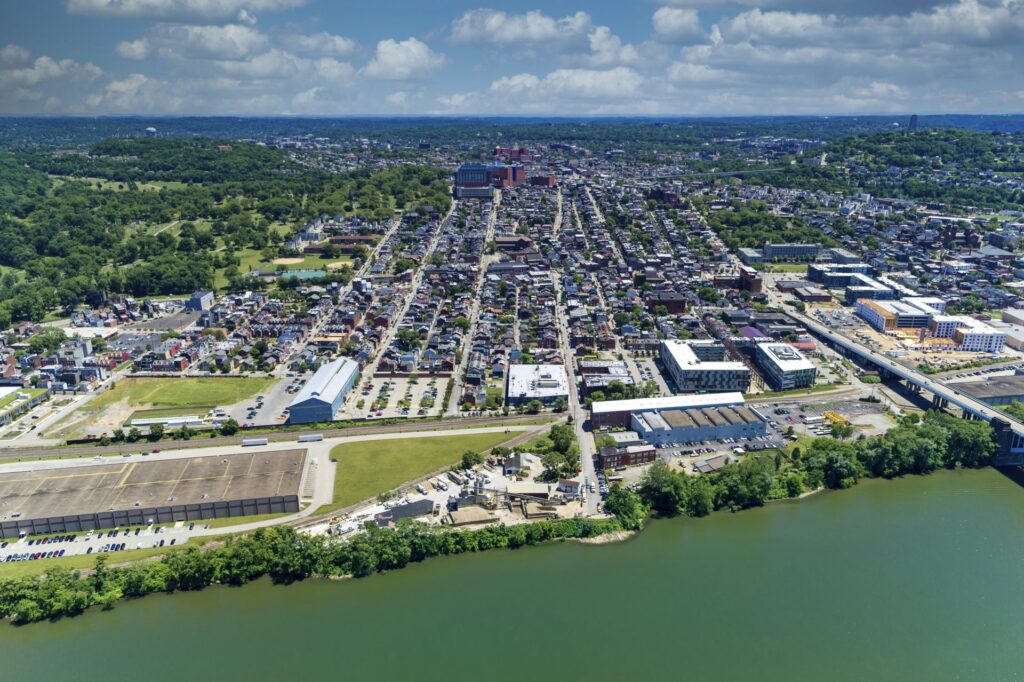“The rise of Robotics Row is as much about real estate as it is tech,” GeekWire noted in its reporting on the emergence of Robotics Row in Pittsburgh. “A lot of these companies need big open spaces for research, development and testing. Pittsburgh’s stock of old mills and factories provide ample opportunities for these companies to find the space they need. The Regional Industrial Development Corp. had a lot to do with…[developing] manufacturing, industrial and research and development space throughout the area.”
RIDC acquired the 14-acre former Heppenstall Steel Company site in 2002, a Pennsylvania brownfield, which is about the same time Pittsburgh Magazine called Lawrenceville: “Once a blue-collar neighborhood more down-and-out than up-and-coming.”
However, with the site’s proximity to universities commercializing cutting edge research and development, RIDC knew that a property like this one could become a valuable asset for the community. RIDC saw the beginnings of a vibrant technology-oriented industry that could become stunted by a lack of suitable real estate and the corresponding opportunity to create homes for businesses of the future by redeveloping the obsolete, abandoned old industrial sites of Pittsburgh’s past.
This project was not without its risks and certainly included significant initial costs. The remediation process required the design and installation of vapor barriers to prevent vapor intrusion in all buildings and restrictions on the withdrawal of groundwater under the property. And all buildings to be razed needed to be environmentally remediated prior to demolition.
Today, the section of the site that formerly housed a chocolate factory has been renovated into a multi occupancy, technology and life sciences hub. One of the first buildings to build spec lab space for emerging companies, its tenant list now includes SeqCenter, Predictive Oncology and LifeX.
The former Heppenstall building, a 30,000 square-foot heavy industrial high-bay facility, was built out for Carnegie Robotics, a spin-off from the nearby National Robotics Engineering Center (NREC).
Also in Lawrenceville, the 64,000 square foot Tech Forge building is an example of a new high-tech, amenities rich flex market segment – tech-flex. It is specifically made for robotics companies and other advanced technology users, including those in R&D, design, engineering and manufacturing, who require some level of manufacturing capabilities to develop their products.
Whether a company specializes in driverless cars, unmanned aircraft, self-driving industrial vehicles, or robots that clean and inspect sewage systems, they need the kind of versatility of a mixed-use space that allows them to design, build, test and tinker with their products all at one location. Tech Forge was designed to be easily convertible, flexible in usage and customizable for tenants’ unique needs, incorporating high-amenities such as:
- Green spaces and picnic areas
- High speed WIFI throughout the facility
- Year-round AC/heating throughout the entire space
- Rooftop patios
- Skylights to let in natural light
- Bicycle- and pedestrian-friendly roads and paths
Designed to LEED Platinum equivalent by Desmone Architects, the building has a low energy footprint, operating at 30% more efficient than code. It has loading docks and high bay ceilings so that tenants like Caterpillar can drive in trucks and other large vehicles to adjust sensors, software and parts.
The space was designed to enable showers and features amenities like bike racks (more than required by code), a green roof deck and bioretention areas. The green roof deck and bioretention areas not only manage storm water – with approximately 7,214 cubic feet of stormwater storage volume that offsets the use of public water – it also provides a great space for employees to step outside for fresh air and great views of the downtown area and Allegheny River.
We are pleased to have tenants including Innovation Works’ Robotics Factory, supporting and growing innovative start-ups, and Caterpillar’s Pittsburgh Automation Center, working on autonomous technology.
RIDC’s history in Lawrenceville shows how critically important it is for someone to come forward and take the lead in developing future homes for new businesses – and sending a message that the community is positioned for economic development.


